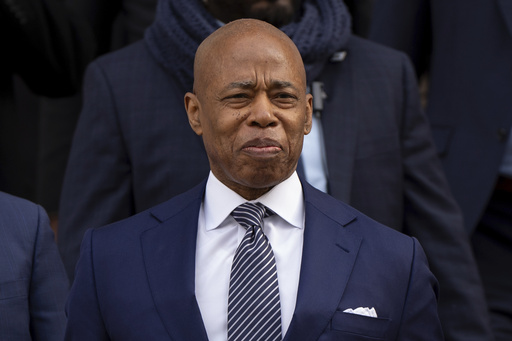NEW YORK — Mayor Eric Adams of New York City finds himself amid a challenging legal and political landscape as he awaits a ruling from a judge regarding a request from the Justice Department to dismiss a federal indictment against him. This indictment alleges that he received lavish travel benefits and illicit campaign contributions from foreign entities aiming to influence him.
Adams faces possible repercussions from the political sphere as well, particularly concerning whether Governor Kathy Hochul might consider removing him from his position due to concerns about how his reliance on the Trump administration might compromise his independence in addressing his legal troubles. During a recent court hearing, Adams testified under oath, refuting any allegations of a quid pro quo arrangement that would benefit him in exchange for cooperation with the federal government on immigration enforcement measures. However, the Justice Department’s lawyer argued that it was imperative to drop the charges so that Adams could assist with initiatives related to national security and immigration under the Trump administration, a point that raised significant eyebrows and exacerbated fears of potential reliance on Republican leadership.
The case’s critical decision rests with U.S. District Judge Dale E. Ho, who is evaluating the Justice Department’s appeal to dismiss charges against Adams, which include conspiracy, wire fraud, solicitation of illegal campaign contributions, and bribery. Acting Deputy U.S. Attorney General Emil Bove stated that the department is exercising “prosecutorial discretion,” claiming that the indictment interferes with Adams’ ability to serve effectively as a mayor and campaign for a second term.
In a perplexing twist, the Justice Department plans to reserve the option to revive the indictment at a future date, a strategy that Bove noted would be reassessed post-election. Adams has consistently maintained his innocence and has entered a not guilty plea in response to the charges against him.
The Justice Department’s request has met with significant pushback, leading to the resignation of seven prosecutors, including the lead prosecutor from Manhattan. Internally, dissent has emerged, with some asserting that freeing Adams from legal consequences to advance policy objectives sets a dangerous precedent. A group of former U.S. attorneys has recently urged Judge Ho to involve additional parties in this legal discourse, advocating for a more comprehensive examination beyond the current government and defendant perspectives. An independent special prosecutor has also been suggested to carry out the case.
As for when Judge Ho will make his decision, he has not specified a date but suggested a prompt resolution is in everyone’s best interest. He remains cautious, balancing the need for judicial oversight without overstepping his bounds, as it has been historically uncommon for judges to deny dismissal requests when both parties are in agreement.
The process for removing Adams from office is fraught with ambiguity, despite Hochul’s capacity as governor to initiate such a move. She has long been a supporter of Adams but has recently met with key figures to discuss the implications of his situation, especially following the resignation of several of his top aides. Nevertheless, Hochul’s latest stance suggests she will not move to remove him immediately but instead aims for heightened scrutiny and oversight of his decisions.
Should Hochul decide to pursue removal, the protocol would involve formal charges against Adams that would allow him to contest these claims in a quasi-judicial setting. Historically, such actions have rarely occurred, though Hochul has acknowledged the troubling nature of the allegations impacting Adams’ administration.
In response to the growing pressure and uncertainty surrounding his position, Adams has remained defiant. He has characterized the calls for his resignation as politically motivated and expressed unwavering confidence in his innocence. At a recent hearing, he exhibited a seemingly buoyant demeanor, making light-hearted comments and showing no fear regarding potential consequences from the Justice Department.
Despite the mounting pressure, Adams continues his public engagements, eyeing upcoming speaking events while also limiting his interactions with the press. He has been critical of what he views as biased coverage but remains resolute in his assertion that he has not committed any crime and doesn’t foresee the government pursuing the case again.




